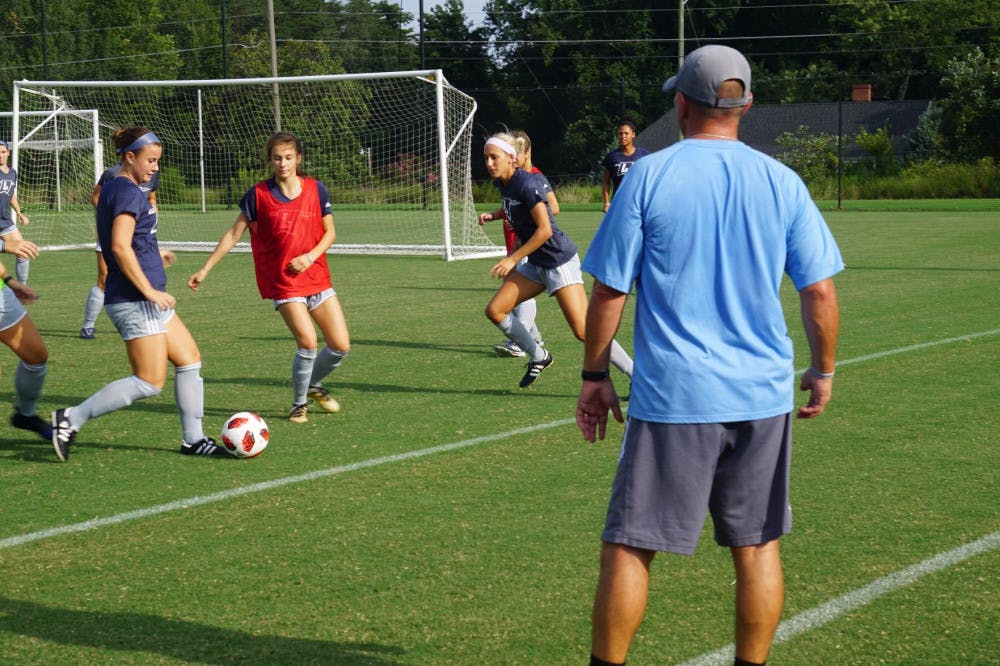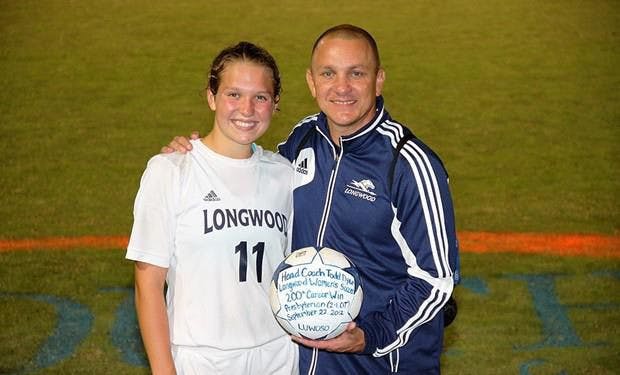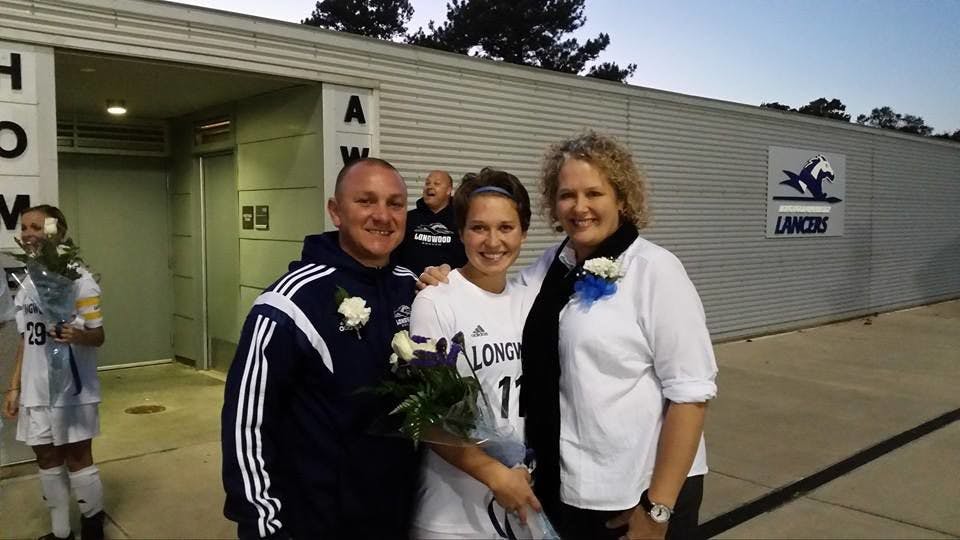Formerly an all-female institution, Longwood College quickly established men’s athletic programs after becoming co-ed in 1976. Men’s sports rapidly grew before women’s sports even had the chance at any growth – including an established men’s soccer team before a women’s program. But, with the department continuously growing, it was a matter of time before a women’s program became a reality.
For a 23-year-old Todd Dyer, the timing was just right.

Women's soccer coach Todd Dyer picked up the head coaching job by chance after his four years of playing men's soccer.
Dyer was a star for the Longwood men’s soccer team 26 years ago. A Manassas, Va. native, he didn’t always have aspirations to play soccer at a higher level. Dyer was a multi-sport athlete in high school, playing football, soccer and baseball, but primarily focused on basketball. It wasn’t until sophomore year of high school when his passion for soccer grew, unlike the height needed to play basketball.
“Recruiting didn’t move as fast back then as it does now, so in tenth grade I wasn’t thinking about college at all,” Dyer said. “I knew I wanted to play in college if I had that opportunity.”
He eventually became an All-State high school soccer player under his coach, Ken Krieger. Dyer idolized Krieger, who, if his last name sounded familiar, is the father of U.S. Women’s National team star and World Cup champion Ali Krieger. He wanted to do exactly what Krieger did: teach and coach high school kids.
Dyer met his future wife, Cassie, at Osbourn Park High School. She ended up being recruited by Longwood for basketball and softball, and eventually committed. Dyer, without being recruited, followed his high school sweetheart to Farmville and walked-on to the men’s soccer team.
In his four years, he was a standout midfielder and two-time captain for the program. In the midst of making his mark, he established a rapport with the athletics department, serving as a student assistant coach with the softball team for three years as an undergraduate. This, again, was his way of spending more time around his girlfriend.
His plan was always to both teach physical education and coach at the high school level. However, his connection with the athletics department and former softball coach, Loretta Coughlin, brought him to having lunch with her and the late Athletics Director Emily Harsh just before graduating in the spring of 1993. He was told the school was establishing a women’s soccer program in the fall of 1994, and suggested he should apply.
“Obviously I was super young, but I had played club, high school and college soccer, and after graduation I coached club soccer,” Dyer said. “Timing helped me out a lot.”
The athletics department showed how much trust they had in a young college graduate, hiring him as the first-ever women’s soccer head coach with an annual salary of $4,000. Although he is known for “establishing” the program, he said just so happened to be the first person they hired to be the head coach, though it takes more than just being appointed as a head coach to become a formidable program.

Kylie Dyer said her father is "one hundred percent" the reason why she got into playing soccer, eventually playing and succeeding under him at Longwood.
In the months before starting, he taught back in Prince William County, and Cassie, who had graduated a semester before him, had just landed a teaching job in Prince Edward County. That same year, they gave birth to their daughter, Kylie, and permanently made the move to Farmville.


According to Kylie, her father is “one hundred percent” the reason why she fell in love with the game he coached.
He was on yearly contracts the first couple of years of his young coaching career. Before the explosion and growth of women’s soccer, coaching for Dyer was based on trial-and-error.
“I was a young coach, and you’re trying to win your first game, then you’re trying to win your second game. So you’re not thinking too far ahead, but it was definitely a learn-as-you-go process in terms of how to manage a program, how to coach a team, all those things,” he said.
At the same time, basketball, baseball, softball and men’s soccer were some of the main sports back when Longwood College was a Division II program. Therefore, the athletics department was more lenient on how the women’s soccer program was run at the time, giving Dyer room to work with while he learned his role.
“I don’t think they were worried about me, they were just trying to feel the team and I was the guy they hired, and they allowed me to do my job,” he said. “I was a young guy, but I don’t think they were too worried about it.”
Current women’s soccer Associate Head Coach Rich Stoneman knows a thing or two about establishing a program, as he was a member of the staff at Louisiana Tech University who started their own women’s soccer program in 2004.
“It’s a process, you’ve got to get to know these kids and they’ve got to get to know you,” Stoneman said. “You have to establish trust, friendship and loyalty there, and those things take time.”
However, it didn’t take long for Dyer to establish these aspects. His women’s team was immediately successful, accumulating 17 wins in his first two years as head coach. Because of the early success, Dyer wasn’t worried about job security despite being on yearly contracts. Not only was he confident, but the athletics department showed even more confidence in him when the men’s soccer coach left the program in 1996, leading them to appoint Dyer to coach both programs.
“I always said it was two opportunities to win because everything was a doubleheader,” Dyer said.
His women’s soccer team was an extremely successful Division II program, almost guaranteed to win 10-12 games a year, but while coaching both teams, he led the men’s program to their first championship in 2000 before finally leading the women’s program to their first title two years later in 2002.
After seven years of coaching both programs, the athletics department made the decision to reclassify and officially become an Independent Division I school. Following this decision, Dyer was approached and given the choice to coach only one of the two teams.
“I had always been the women’s coach, it just felt like a more comfortable fit. With women, you’re dealing with the heart, with men, you’re dealing with the ego,” Dyer said with a laugh. “And if I’m going to do it forever, give me the heart.”
Dyer had officially become a Division I head coach. Although not yet affiliated with a conference yet, he led his team to four double-digit win seasons in the eight seasons as an independent program.
In 2013, Dyer hired Stoneman to his staff, eventually promoting him to associate head coach. The immediate, welcoming feeling Dyer provided emphasized the type of environment he established in the almost two decades of coaching.
“The first vibe when I got here was that this was a family environment,” Stoneman said. “A lot of people preach family and talk about it, but this was a place where those words have a lot of truth.”
Finally, in 2012, 18 years into Dyer’s coaching career, former Athletics Director Troy Austin struck a deal to become an official member of the Big South conference. In only seven years as a member, Dyer has built the program into a household name, though still no Division I championship. One of the few programs who have more success than women’s soccer is the softball team and their Head Coach Kathy Riley. She has already etched her name in record books multiple times, being one of coaches with the most wins in Longwood history in her 21 seasons.
The game since becoming head coach has changed immensely, especially after becoming members of the Big South, putting Dyer under more of a spotlight than in the early 90s.
“It was a first-year program in a pretty new and growing sport, that was at the very beginning. Now, so to speak, it's big business,” Dyer said. “Everything has changed. The talent is better, the coaching is better, the demands on players and coaches are greater.”
Dyer celebrated the program’s 25th anniversary this past season, a celebration organized by his daughter before a game. His storied career includes a Big South Coach of the Year award, an appearance in a conference championship game, being able to coach his daughter and now being a single flight of stairs away from where her office is.
He can be found at Longwood sporting events; as a fan, volunteer or coach. He’s cemented a legacy both inside Tabb Athletics Hall, and out on the field. Considered a “first family of Longwood,” he hopes to fill in one last gap in his trophy case.

The Dyer family is dubbed as the "first family of Longwood" due to their long family history in Farmville.









